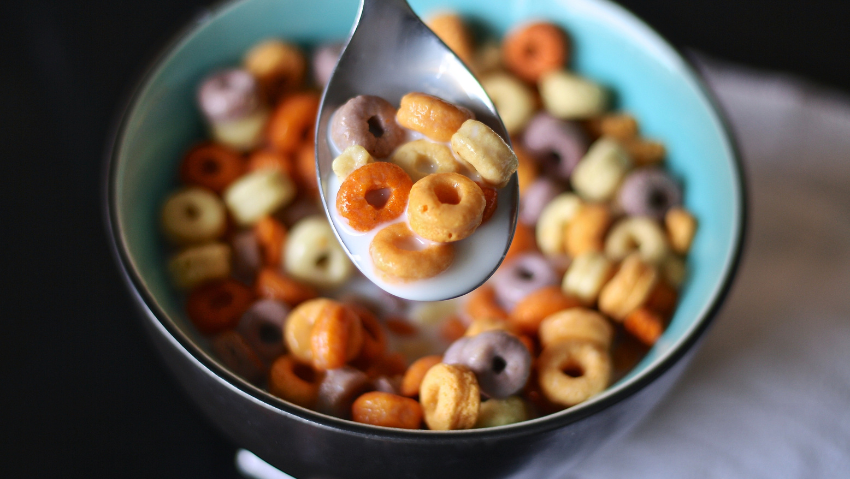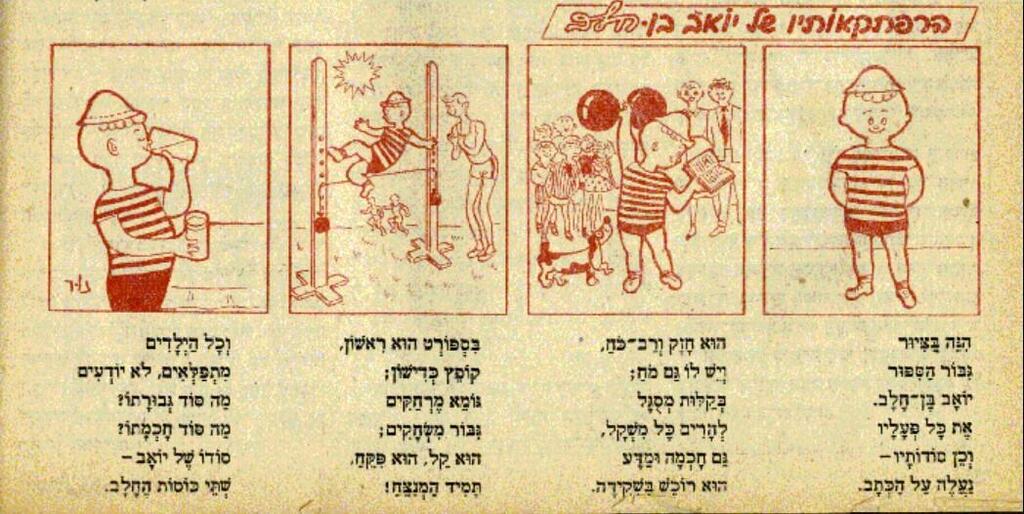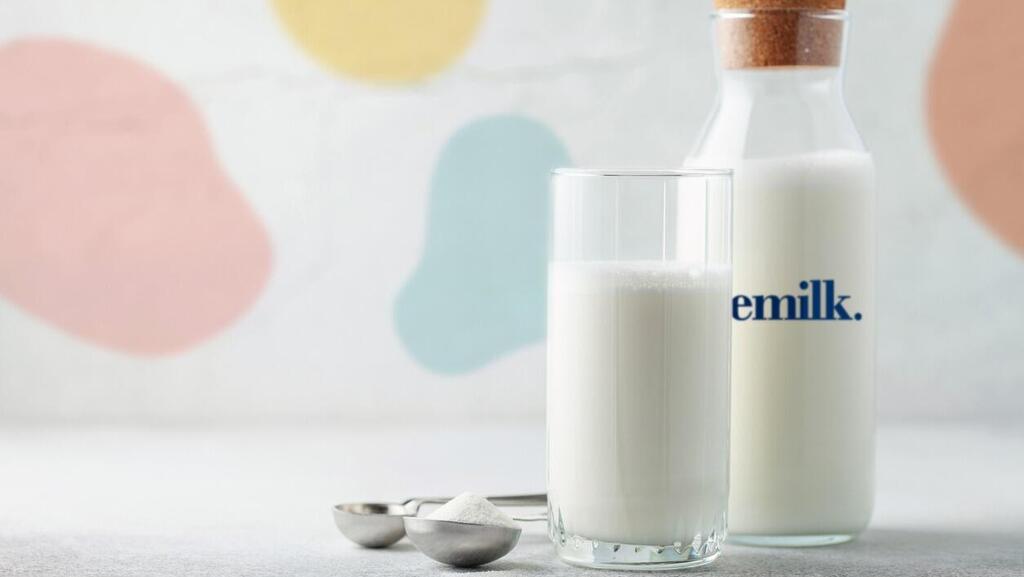Getting your Trinity Audio player ready...
The proliferation of dairy products and their substitutes is an ongoing process that has been unfolding for years, and it turns out that it is far from reaching its peak.
Read More:
However, in recent months, we can observe new developments in the dairy industry, and it is hard not to connect the dots: a historic surge in controlled milk prices, as well as the prices of basic dairy products such as cottage cheese and sweet cream, which have increased by 9%, with further price increases expected in the coming year; approval from the Health Ministry for the production and sale of synthetic milk, meaning milk that is created synthetically without the involvement of cows; and the holiday of Shavuot, the holiday of milk and cheese.
These events raise the question: When did milk, the "tribal flag" of the Israeli refrigerator, transform from a single, unified product - in a bag or a carton, in blue and white colors - into a whole world of choices, substitutes, and flavors? Is this the end of the golden era of milk, or are we actually just at the beginning? And what does all this say about the conflicts within Israeli society and about us as individuals?
The realization of the divine dream
"Milk is an ideological fluid filled with values, interests, and aspirations," wrote Prof. Nimrod Luz, Head of the Research Authority for Studies of the Land of Israel at the Kinneret Academic College, in his book "Launch Break." In an interview, he explains that the two defining moments of milk were "its availability following Louis Pasteur's invention in 1862, alongside the significant invention of breakfast cereals in 1894. Food researcher Marion Nestle commented that if you remove the colors and preservatives from the cornflakes, it is nutritionally better to eat the box."
The choice of milk is not coincidental: milk has been ingrained in Western consciousness as a symbol of purity, virtue, clarity, and health," explains Prof. Luz. "Today we are beginning to understand how much darkness lies within this whiteness. In extreme vegan circles, which promote the understanding that this industry is harmful, they do not use the word 'milk' but rather the word 'pus,' which is created due to the excess milk produced by cows and the sores on their udders."
The connection between milk and the Jewish settlement even before the establishment of the state was strong from its inception. In her article "The Child Needs Milk, and Milk Needs a Market: The Politics of Nutrition in the Yishuv between the Two World Wars," researcher Efrat Galad points to the Zionist movement's efforts to create an association between milk and Jewish nationalism. "To supply fresh milk to consumers, local Palestinians would travel with their goats and milk them in front of customers," wrote Galad. This practice lasted only a short period, both due to the preference of the Yishuv's leaders for cow's milk and the Jewish leadership's attempts to minimize this interface with the help of the British Mandate and establish a Zionist dairy industry.
Cow's milk was a central part of the Zionist agricultural ethos. "Agriculture and working the land were supreme values for labor Zionism, the mainstream of Zionism," explains Galad.
"In the Zionist imagination, the laborer's agriculture was more than just a system—it was a means to transform Jews from a state of eternal wandering to a legitimate political identity, with an intimate connection to the land."
As part of constructing the image of the "New Jew," in contrast to the Diaspora Jews, a connection was created between milk consumption and physical strength.
Medical research claiming that milk consumption promotes height growth among children encouraged Zionist leaders to strengthen Hebrew children by providing them with a daily milk ration. In 1934, the "British Milk Law" was enacted, which ensured that every student received a reduced-price glass of milk per day. Tnuva, established in 1926, gladly adopted this model.
At the Milk Conference held in 1938, initiated by the Jewish Agency, it was explained that the children of the settlement would receive "healing milk" every morning as part of the Zionist project, which would benefit both the individual and the entire Jewish nation. It was argued that there should be unity between the child and the dairy, under the assertion that it served a national purpose.
"The child needs milk, and the dairy needs support," it was said. "Milk was a symbol of the development and consolidation of the Jewish settlement in the land of Israel and its Zionist-socialist realization," wrote Professor Luz. "If we add to that the biblical promise to the children of Israel in Egypt of reaching a land flowing with milk and honey, the dairy industry presents the Zionist settlement as the fulfillment of the divine vision."
In 1956, the dominance of the dairy market was achieved with the establishment of the "Milk Production and Marketing Board," now simply called the "Milk Board." The board, appointed by the government, was founded explicitly to increase milk consumption among Israeli citizens, represent the dairy industry to the government and its institutions, and ensure professional standards in the field.
Since 1965, it has operated as a limited company, and in 2011, the Milk Industry Planning Law was enacted, regulating the dairy sector within its framework.
The Milk Board provided milk to children through a new and highly popular artistic medium beyond the sea - comics. If Americans had Superman and Batman, we had "Yoav Ben-Halav," created in 1960 by the artist Gur (Antol Gorbicz). It was published in the comics section, which was, in fact, an advertisement for milk consumption in the newspapers "Davar Leladim" and "Haaretz Shelanu."
Comic researcher Eli Eshed defined the character as the "original Hebrew superhero since Samson." Eshed explained that Yoav Ben-Chalav, the weak and fair-haired child, derived his powers from "drinking two cups of pure milk," which gave him the strength to overcome terrorists, robbers, and even aliens as the stories became bolder. Later, Yoav was replaced by "Dror the Hero," who gained his "eagle powers" only from concentrated milk.
If the connection between milk and Zionism, and later Israeli identity, is so strong, is our choice of soy or almond milk politically motivated? Does our distancing from milk reflect our distancing from Israeli identity itself? When we prepare coffee with oat milk for its exotic flavor, are we turning our backs on the Zionist ethos?
"It is possible that the question you are asking is another expression of the question marks we have today about our nationalism," says Professor Luz. "In other words, the narrative is no longer unified. We see this also in the struggles for the judicial revolution. Suddenly, we can see that we are speaking with many voices. Soy milk and oat milk challenge the classical national perception.
We can see the connection between the debunking of the nationalism myth and the debunking of the milk myth. There are more and more people questioning the connection between milk and Shavuot, between health and milk."
In other words, our distancing from milk can be understood as distancing from the nationalist idea
"If milk was the national beverage, supporting the Israeli dairy industry was important, and drinking milk was Israeli, suddenly we put it into question. I see connections here."
Skipping breakfast
If it seems to us that the shelves are already filled with all kinds of milk beverages, Michal Betzer, the Marketing Department Manager of Tnuva's dairy division, says that this is just the beginning.
Michal, do we really need 17 types of milk?
"That's a question of how many products are needed on the shelf. In the past, there were far fewer, and today the variety is enormous. As we offer more solutions, we see further growth. We haven't reached saturation yet. There is room for all this variety in terms of consumer diversity. We may reach a point where we feel optimal saturation. The topic of personalization will not disappear. People want as many solutions as possible for their increasingly precise needs. Our role as suppliers and manufacturers is to provide a response."
The decline in the consumption of Negev milk (goat milk) is not significant. According to a report from the Milk Board, there was a decrease of -0.9% in consumption between 2021 and 2022. It is an almost negligible rate, but there is also no significant decline. We can definitely talk about a market freeze.
"The stagnation occurs because everyone's breakfast looks different, and they skip it," explains Betzer. "On the other hand, more and more people are identifying lactose sensitivity. The stagnation is felt mainly in goat milk, and there is an increase in the transition to milk substitutes. It is a huge trend worldwide, including in Israel."
Where has the "milk of the past" disappeared from the Israeli refrigerator?
"I don't think it has disappeared; it is still the central mass. Many times, even if there is a substitute or lactose-free milk, the blue milk with spots will also be in the fridge. Sales are stagnating, increasing at a slow rate lower than the population growth rate, and that's true. Some of it is complemented by substitutes. The other part is a change in consumption behavior: more people drink espresso or black coffee. It's part of the culture."
How do you deal with the decline in milk consumption from a marketing perspective?
"In milk, there is a value of security above all. In our perception as human beings, as infants, we see it as an aspect of nourishment and basic security, and in this aspect, sometimes there is no need for variety. Milk itself, as a category, does not require much innovation. Its role at home is to provide security. Food is a cultural matter from all angles."
Who are the people choosing the most adventurous products on the shelf?
Consumers of "Alternative" (a series of milk substitutes - Ed.) are a larger category than before. Consumers who are vegans, for nutritional or ideological reasons, are a small part of the consumption. The majority of the consumption of substitutes comes from those who want a better solution than Negev milk. The consumption mass consists of those who prefer both options. The majority of the consumption is done by women over the age of 50.
Cultured club
In April of last year, Israel became one of the first countries in the world to receive approval from the Ministry of Health for cultured milk production, created artificially without harming animals. These are dairy products that are based on real milk protein but without lactose or cholesterol, as well as without growth hormones and antibiotics given to cows. The process is significantly more environmentally friendly compared to traditional dairy farming, and it does not harm animals.
The Health Ministry granted regulatory approval to the Israeli company Remilk, which produces the milk protein powder used to make various products. Remilk already markets its products in the United States, while in Israel, the company Terra will be the first to market milk based on the milk protein powder, as reported in "Calcalist." Remilk is just one of the companies involved in this development. The Israeli company WILK, which was established in 1986, is also developing cultured milk (with an important difference - theirs includes lactose).
How is cultured milk produced?
"It's a technology that comes from the realms of biotech into the food world, allowing us to use yeasts or bacteria that are approved for food production in small-scale units, where we can produce any food component we want without the need to raise the animal," said Dr. Tami Miron, a lecturer in product development at the Hebrew University and a member of the Israeli Fermentation Society.
According to Dr. Miron, the process begins with extracting the DNA sequences of milk and introducing them to bacteria or yeast that are approved for food. This creates protein in a way that does not harm animals, does not pollute the environment, and does not exacerbate the climate crisis.
However, there are additional obstacles before we can find cultured milk on the shelves. For example, there is the issue of kosher certification approval. Milk protein may be considered "non-kosher," but there is still no definitive Halakha ruling on the matter.
Contrary to Israel, milk consumption in the United States has significantly declined in recent decades. According to CNBC, while milk consumption accounted for 15% of total food consumption in 1984, in 2019, this figure stood at only 9% of overall consumption. The decrease in cereal breakfast consumption and the transition to protein-rich and sugar-free breakfast options have also impacted milk sales. In 2019, Dean Foods, a major milk supplier in America, announced its bankruptcy.
Is the decline in Negro milk consumption in the United States a generational issue? According to The New York Times, milk consumption has dropped by 20% among Generation Z, young individuals aged 11 to 26. The dairy industry is attempting to use new marketing strategies and investing in young athletes to represent cow's milk as beneficial and healthy.
However, even the brand ambassador of "Gonna Need Milk," Ivy Zezeh, a 24-year-old marathon runner from New York, admitted in an interview with The Times that she doesn't personally drink milk. She is aware of the risk it poses to asthmatic individuals, which could jeopardize her sports career, and she acknowledged that "realistically, it's not healthy."
Generation Z strongly criticizes celebrities who choose to promote milk. The "Got Milk?" campaign of the 90s, which lasted until 2014, featured famous personalities such as Paul McCartney, Whoopi Goldberg, the Simpson family, Britney Spears, and the Olsen sisters with a "milk mustache," portraying milk as sexy. This message no longer resonates today, as awareness of the harm caused by the dairy industry to animals and the environment becomes more transparent and accessible.
If in the 90s, participation in the campaign promoting the dairy industry was a symbol of status and recognition as an international celebrity lending their face to promote a seemingly healthy cause, today, promoting the same campaign actually carries a real risk of cancellation. That's what happened to actresses Aubrey Plaza ("Parks and Recreation") and Emma Roberts ("American Horror Story"), who joined the new MilkPep campaign, the same organization that created the iconic campaign in the 90s.
Plaza recently participated in a campaign that mocks milk alternatives, in which a plant-based milk called "Tree Milk" was introduced. She was immediately attacked on social media and accused of promoting "pro-dairy propaganda." In the advertisement, Plaza uses her famous dry sense of humor to make fun of "fake" milk. She appears promoting a fictional brand called "Tree Milk," which, as the name suggests, is milk made from trees. She turns to the camera and asks, "Is tree milk real? Definitely not. Only real milk is real."
Among Generation Z, there is less connection to celebrity endorsements. The animal rights organization PETA was quick to condemn Plaza for supporting a cruel and destructive industry, and the food magazine "Bon Appétit" referred to Plaza as the "new and disappointing face of milk wars." Twitter users reacted with a spirit of "I'm not angry, I'm disappointed." Roberts' similar video also stirred angry responses. Young people are less inclined to support the dairy industry, and even Aubrey Plaza won't be able to convince them.
Until the milk wars are settled, we will try to withstand the dairy industry's attack on us in anticipation of the holiday of Shavuot, a holiday that is not inherently related to milk or its consumption.
Historian and writer Dr. Uri Meir Chizik explains: "We celebrate milk during Shavuot because the dairy industry is one of the powerful forces in the market. Throughout history, milk was not consumed here in the quantities we consume today in Israel. We need to leave dairy products or greatly reduce them and eat real, nourishing, unprocessed food. Instead of celebrating Shavuot with milk, we should buy vegetables from local farmers and support our agriculture. These holidays are an opportunity to celebrate local produce."





